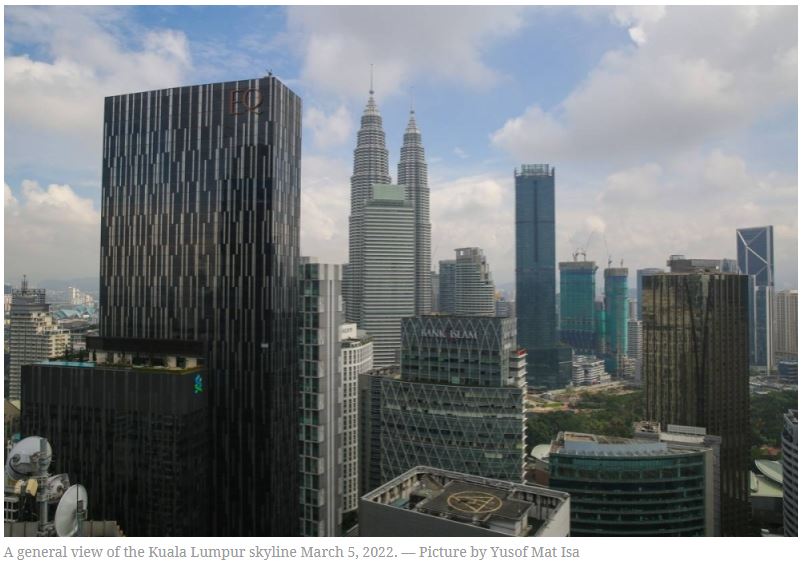IMF sees Malaysia’s economy expanding 5.75pc in 2022
KUALA LUMPUR, May 19 — The International Monetary Fund (IMF) is optimistic that Malaysia’s economy will expand by 5.75 per cent in 2022, driven by pent-up domestic demand and continued strong external demand.
This is in line with the government’s growth projection of between 5.3 per cent and 6.3 per cent for 2022. The economy expanded by 3.1 per cent last year.
In providing an assessment of Malaysia’s growth prospects, the IMF noted that the country’s high vaccination rates and limited movement restrictions would also support economic expansion.
On the flipside, the Washington-based agency acknowledged that there were substantial downside risks, including from the Covid-19 pandemic and the war in Ukraine, a similar predicament faced by both developed and developing economies globally.
“Malaysia’s growth is projected to be solid in the medium term, although risks of long-term economic scarring are real,” the IMF’s Executive Board said in its conclusions following consultations with Malaysian officials in an assessment report released last April.
The IMF also welcomed Malaysia’s accommodative monetary policy stance, as inflation expectations are well anchored.
To this end, the IMF noted that Malaysia’s commitment to exchange rate flexibility, saying it will continue to serve the country well.
This was further reinforced just last week when Bank Negara Malaysia reaffirmed its position that it will not peg the ringgit despite the apparent weakness of the currency.
This was because the banking sector was still well-capitalised and highly liquid, buttressed against a strong asset quality.
The IMF also said that Malaysia’s financial sector “remains resilient,” and that it was encouraged by its reforms that focused on inclusion, economic transformation, and a sustainable economy.
This was clearly reflective of Prime Minister Datuk Seri Ismail Sabri Yaakob’s Keluarga Malaysia concept which focuses on inclusion, togetherness and gratitude aimed at bringing the people together in helping the country recover from the debilitating Covid-19.
The IMF, which has 190 member countries, also lauded the implementation of the 12th Malaysia Plan as it focused on boosting labour productivity, enhancing the digital and green economies, and strengthening fiscal governance.
“This would help minimise pandemic-related economic scarring while promoting inclusive growth and job creation,” the IMF said.
It also took note of the assessment by IMF staff that Malaysia’s external position was moderately stronger than warranted by economic fundamentals and desirable policies.
The IMF also called for policies to strengthen social safety nets to support an inclusive recovery and facilitate external rebalancing, which Malaysia was already doing via its multi-billion ringgit Covid-related budgeting.
In reviewing 2021, the IMF said the swift, substantial, and multi-pronged pandemic policy response supported the economy.
Total Covid-related budget spending amounted to RM39 billion (about 2.5 per cent of GDP) in 2021, more than double the initially budgeted RM17 billion, and above the RM38 billion spent in 2020.
As a result, the federal government’s deficit reached about 6.5 percent of GDP in 2021, higher than about 5.5 deficit foreseen in Budget 2021.
The federal government’s debt is estimated at 63 per cent of GDP, below the domestic debt ceiling of 65 per cent, it said.
Established in July 1944 after the Great Depression in the United States, the IMF works to achieve sustainable growth and prosperity for all of its member countries.
It does so by supporting economic policies that promote financial stability and monetary cooperation, which are essential to increase productivity, job creation, and economic well-being. — Bernama


 English
English




